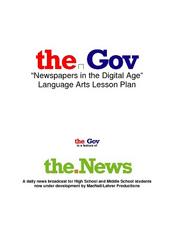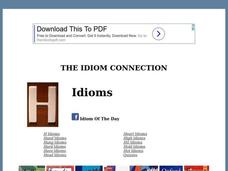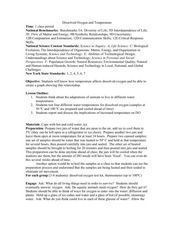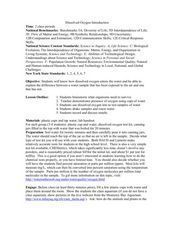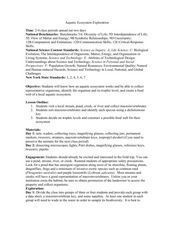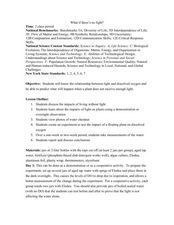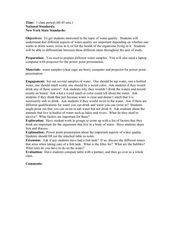Curated OER
Come Fly with Me . . . Open a Book: Travels through Literature
This detailed overview of a curriculum unit suggests using travel literature to engage and stimulate your third graders’ interest in reading. The suggested reading list includes fiction and non-fiction materials and offers urban children...
Curated OER
Avoiding Consumer Fraud: Financial Scams and Schemes
Young consumers get a hefty dose of information on how fraud can put their financial health at risk. The resource provides detailed lecture notes, scaffolded notetaking sheets, vocabulary worksheets, transparencies, and seven links to...
Curated OER
Newspapers in the Digital Age
Is journalism more or less reliable with the influx of Internet sources? Learners investigate the issues of freedom of speech, journalistic ethics, and social responsibility in the age of Twitter and Facebook. After examining the...
Anne Frank House
Who Was Anne Frank?
Set the stage for a study of The Diary of a Young Girl with a resource that includes background information about Anne Frank's early years, the Nazi invasion of the Netherlands, her Secret Annex hiding place, and her capture and...
Curated OER
Reading Our Neighborhood
Students explore their environment and what they can read. In this instructional activity about signs, letters, and pictures in the neighborhood, students will observe what they see around them. Students walk around and take pictures of...
Curated OER
Yard Sale
Students complete activities to discover spending, goods, services, price, advertising, choice, alternatives, criteria and opportunity cost.
Curated OER
Women Following Washington's Army
Students study about the role of women in modern early warefare. They participate in a teacher-led discussion and work individually or in groups to complete a worksheet and discuss their ideas.
Curated OER
Is Capitalism Good for the Poor? | How Incentives Affect Innovation
Learners focus on the role played by a nation's institutions in generating creativity, invention and innovation, and analyzes how innovation promotes the economic growth that raises standards of living and alleviates poverty.
Curated OER
The Common Tragedy of Consumerism
Students evaluate the effectiveness of current climate change solutions. In this global warming lesson, students look at the current measures implemented and analyze whether they are beneficial to the environment or not. Advance reading...
Curated OER
Sayings Quiz: Patience
In this sayings about patience activity, students complete sentences by interpreting English sayings about patience.
Curated OER
Areas of Irregular Figures
In this calculation of area worksheet, students solve 3 problems in which areas of irregular figures are determined. The examples show the formula and method.
Curated OER
Total English Advanced: Fortunes Crossword
In this fortunes crossword puzzle activity, students practice key vocabulary as they read the 17 clues to correctly fill in the word puzzle. Students also write 5 sentences using 5 of the words or phrases from the crossword puzzle.
Curated OER
Inside the Vault-Entrepreneurship
Students explore entrepreneurship. In this economic study lesson, students take a pretest on attitudes, review characteristics that make up an entrepreneur, review a list of famous entrepreneurs, and create a 5 minute oral presentation...
Curated OER
Idioms
In this idiom worksheet, students read the given statement and select the correct idiom for what is being said. Students complete 25 multiple choice questions and self check with this online interactive worksheet.
Curated OER
Free Enterprise: A Context for Technology
Introduced your class to the topic of free enterprise and its relationship to personal freedom. As a class, they brainstorm the ways in which what they do affects the free enterprise system and how technology can make the transition...
Curated OER
Dissolved Oxygen and Temperature
Students are shown how temperature affects dissolved oxygen and they create a graph showing this relationship. They think about the adaptations of animals to live in different water temperatures. Students test four different water...
Curated OER
Dissolved Oxygen Introduction
High schoolers are shown how dissolved oxygen enters the water. They are taught the difference between a water sample that has been exposed to the air and one that has not. Students brainstorm what organisms need to survive. They use...
Curated OER
Is Our Water Healthy?
Young scholars test water for a least one chemical characteristic. They hypothesize how a storm event might change the chemical characteristics of a stream. Students collect water samples and use the chemical test to test the water.
Curated OER
Aquatic Ecosystem Exploration
Learners visit a local stream, pond, creek, or river and collect macroinvertebrates. They sort macroinvertebrates and identify each species using a dichotomous key. Students decide on trophic levels and construct a possible food web for...
Curated OER
What If There's No Light?
students discuss the importance of light and the consequences of living without it. Using a plant as a demonstration, students predict and observe what happens to a plant when it does not receive enough light. In groups, they experiment...
Curated OER
Runoff: Intro to Watersheds
Young scholars are taught that a watershed is, what types of basic land cover are impermeable and permeable to water. They trace the flow of water around their school and around their home. Students determine what watershed their school...
Curated OER
Invasives and Marsh Birds
Young scholars are taught that invasive plant removal can have a variety of impacts. They are shown this by using graphs. Students view maps of vegetation change on Iona Island. They discuss implications of changes on marsh birds using...
Curated OER
Water Chestnut Graphing Activity
Students are taught how to format and enter data into an Excel spreadsheet. They make a graph and interpret graphed data. Students discuss possible impacts of water chestnut invasion. They graph data on water chestnut. Students report...
Curated OER
Water Quality with Samples
Young scholars recognize whether one wants to drink water, swim in it, or for the health of the organisms living in it. They prepare different water samples to observe and collect samples regarding the water quality.


